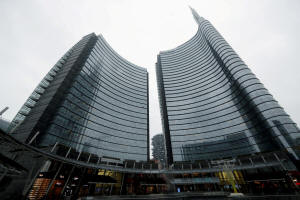Analysis-Boom in European bank earnings hints at a rally with legs
 Send a link to a friend
Send a link to a friend
 [February 23, 2023] By
Joice Alves [February 23, 2023] By
Joice Alves
LONDON (Reuters) - Europe's banks, which enjoyed a stellar
fourth-quarter that yielded a surge in earnings growth to 15-year highs,
are still looking cheap and could have more room to rally.
Economic data hasn't been as bad as many had feared. The euro zone is
expected to stagnate rather than contract, while cost of borrowing is
still rising.
STOXX 600 financials are expected to have had the highest earnings
growth rate of any sector in the last quarter of 2022, and brokers and
investors have taken note, responding with a flurry of upgrades to the
sector as well as inflows.
The STOXX banks index has climbed almost 20% so far in 2023 to five-year
highs, and along with auto, travel and leisure stocks, is a contender
for best-performing sector.
Shares in UniCredit are up a whopping 35% this year, with the Italian
lender galvanising investors by pledging to return 5.25 billion euros
($5.58 billion) from its 2022 earnings after a record quarterly profit.
The European Central Bank's campaign to raise interest rates as it
fights to bring inflation back to its 2% target has been a boon for euro
zone lenders.

Some of the expectations for higher ECB rates have already translated
into higher stock prices, but analysts flagged shares still look cheap
compared to their historical average.
"A lot of the good news of how yields have gone up and the relief from
no imminent recession is fully reflected in their prices," said Hani
Redha, global multi-asset portfolio manager at PineBridge, which has
$143.1 billion under management.
But "this is a sector that has lagged for a long, long time,
particularly in Europe... they (banks) are not necessarily that
expensive on a secular basis," he added.
European bank shares are trading at just 0.73 times their price-to-book
value, according to Refinitiv Datastream. This is below their 20-year
average of closer to 1.0 and much cheaper than their U.S. peers, which
are trading at around 1.1 times.
With the ECB a bit behind the likes of the UK and U.S. central banks,
which started raising rates months earlier, equity strategists said
there is potential for further bank earnings upgrades in the region.
In the meantime, euro zone lenders' earnings per share (EPS) have surged
to their highest since the global financial crisis in 2008.

[to top of second column] |

A view of the Unicredit headquarters of
which many employees are working from home due to a coronavirus
outbreak, in Milan, Italy March 2, 2020. REUTERS/Yara Nardi

The bloc's biggest bank, BNP Paribas, raised its 2025 targets and
announced buybacks, even if it missed expectations in the fourth
quarter. Credit Agricole, France's second-biggest listed bank,
posted a higher-than-expected profit, driven by lower provisions for
bad loans and a strong performance at its investment banking
division.
EARNINGS BOOM
Fourth-quarter earnings for STOXX 600 financials are forecast to
have surged by 44.7% year-on-year to 32.7 billion euros, compared
with a drop of 10% in the third quarter, according to Refinitiv
I/B/E/S data.
This is the biggest increase for any sector, and across the whole of
the STOXX 600 the rate of growth is expected to come in at 11.3%.
Morgan Stanley estimates almost half of Europe's financials will
beat earnings-per-share estimates this earnings season.
"In Europe, earnings upgrades are ongoing and we think there is
still some potential for further upgrades, especially if loan loss
provisions get revised down as the year progresses," says Claudia
Von Turk, Lombard Odier equity analyst.
In the United State, where the rate cycle is more advanced, there's
less potential for earnings upgrades at this point, she said.
But higher interest rates will eventually stop juicing banks'
income.
Europe's biggest bank, HSBC, reported a 92% surge in quarterly
profit, but delivered a cautious outlook.

Similarly, Societe Generale, France's third-biggest bank and Spain's
Santander, the second-biggest lender in the euro zone, both handily
beat expectations but beefed up their buffers against more uncertain
economic conditions.
But for now, with the risk of a deep euro zone recession receding
and business activity improving as energy prices fall and China
re-opens, there is "still room for the banks to run," said Emmanuel
Cau, Barclays head of equity strategy.
($1 = 0.9408 euros)
(Reporting by Joice Alves and additional reporting by Samuel Indyk
in London; editing by Amanda Cooper and Sharon Singleton)
[© 2023 Thomson Reuters. All rights
reserved.]
This material may not be published,
broadcast, rewritten or redistributed.
Thompson Reuters is solely responsible for this content. |